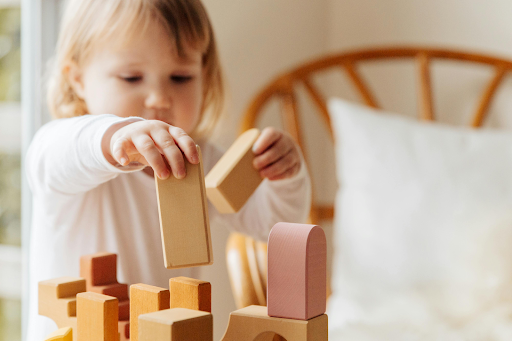 The most important thing in early childhood for children is play, though it forms a base for general development. The truth of child play lies in its ability to nurture growth through activities that children choose on their own, whether structured or unstructured, solitary or social Generally speaking, play is an enjoyable and spontaneous pursuit where children come to know about their world, test limits, and learn how things work. It’s in play that a child learns to navigate their surroundings, learn new skills, and be creative.
The most important thing in early childhood for children is play, though it forms a base for general development. The truth of child play lies in its ability to nurture growth through activities that children choose on their own, whether structured or unstructured, solitary or social Generally speaking, play is an enjoyable and spontaneous pursuit where children come to know about their world, test limits, and learn how things work. It’s in play that a child learns to navigate their surroundings, learn new skills, and be creative.
In the process, they engage in experiences that stimulate their minds and bodies, fostering creativity, imagination, and cognitive abilities. This time of free exploration is essential for their growth because it helps build important life skills that will benefit them for a lifetime. Social interactions can help them learn communication, collaboration, and how to resolve conflicts.
Additionally, play is not only physical but also involves imaginative and role-playing scenarios, through which children manage to process emotional states and learn about different social roles and the feelings of “the others.” By favoring various types of play, parents and educators can help the child construct a more complete set of abilities and a strong, adaptable mindset.
The Role of Play in Child Development
Cognitive Development
Children engage in activities that challenge their thinking and stimulate child brain development through playing. Puzzles and building blocks stimulate better problem-solving capabilities, and games requiring strategic thinking enhance cognitive flexibility. Play encourages creativity because children begin to invent new games and scenarios, encouraging their imagination and innovative thinking.
Physical Development

Physical activity, in the form of running, jumping, or climbing, is essential for both motor ability and coordination. All these exercises enhance muscular strength and balance and also lay down the foundation for a healthy lifestyle in general. Additionally, active play helps children understand their physical limits and capabilities.
Social and Emotional Development
It helps the little ones socialize with their peers, hence developing basic social skills in sharing, taking turns, and cooperating. The children also learn empathy and emotional resilience as a result of role-playing and group activities, which are very vital for being in healthy relations and handling their emotions.
7 Benefits of Play for Children
1. Cognitive Development
Play enhances the cognitive parts of the brain since it develops thinking and problem-solving skills in children. Any game that necessitates solving a puzzle or requires strategizing with blocks stimulates the brain and enhances higher cognitive flexibility. As children invent new games and scenarios, they are also fostering their creativity and innovative thinking.
2. Physical Development
Such physical activities in the form of running, jumping, or climbing are very necessary both for developing motor ability and coordination. All such exercises shall enhance muscle strength and balance and also lay down a foundation for healthy living.
3. Social Development
Interactive play builds necessary social skills, such as sharing, taking turns, and cooperating with other children; in addition, group activities and role-play situations teach children how to feel about one another, how to bargain over roles, and how to settle disputes. These are all important to the establishment of healthy social contacts and effective communication.
4. Emotional Development
Play serves as a vital outlet for emotional expression and processing. Children can invent and enact different roles to understand various emotions and learn how to manage them properly. Imaginative play helps children develop their emotional strength in situations, teaching them how to cope with each situation in a safe and supportive setting.
5. Language and Communication Skills
Indeed, playing together with others promotes children’s language and communication skills. Interactive play exposes children to new vocabulary and language structures that enable them to formulate their thoughts and ideas better. Role-play requires children to negotiate, explain, and describe; thus, they build their conversational skills and fluency. Storytelling and imaginative play also promote narrative skills by encouraging little ones to construct understandable, coherent, and interesting stories.
6. Cultural and Moral Understanding
Play often mirrors the cultural and societal norms that children observe in their environment. Playing can expose children to many cultures and their social roles; thus, they learn to appreciate diversity and inclusion. Group games and role-playing help them to practice fair play and empathy in a safe setting. They develop morality and ethics through such scenarios, building the basis for respectful and responsible interactions.
7. Preparation for Real-Life Situations
Play teaches children practical skills that they need to live. Simulations of real-life practicalities, like playing house or managing a mock store, will improve children’s skills with respect to everyday situations in a safe environment. In this way, they will acquire problem-solving, decision-making, and flexibility when encountering unforeseen situations. Group play also enhances teamwork and leadership skills, which are likely to come in handy later in social and professional settings.
Types of Play and Their Benefits
Structured Play
Structured play refers to activities that are organized and guided by rules or instructions, often led by adults or based on specific objectives. Sports, board games, and educational activities are some examples. They complement learning during playtime by encouraging children to develop specific skills, like following instructions, strategic thinking, or goal-setting. They also provide opportunities to practice discipline and focus in preparation for subsequent success in academics and in life.
Unstructured Play
This kind of play is spontaneous and self-initiated, hence leaving children to explore and engage freely without a plan or agenda. In its nature, unstructured play will in itself cultivate creativity since it involves inventing one’s own games and scenarios. It will also encourage independence because children can decide for themselves what to do and even how to solve problems. Also, autonomy will be developed as well as innovative thinking.
Physical Play
Physical play refers to any type of physical activity that requires exercising, such as running, jumping, playing sports, and many others. For children, it enables the development of motor skills, coordination, and overall health. For adults, it has the same benefits: fitness, improvement in health, relief from stress, and good moods. Active physical play can help strengthen the muscles while improving the health of the cardiovascular system for everyone.
Imaginative Play
Imaginative play, also known as pretend play, is where children invent situations and characters, often mimicking real life or imagining fantastical worlds. This type of play is particularly crucial for creativity because children are able to formulate ideas and practice roles. Imaginative play also advances a child’s problem-solving abilities because, in their imagined worlds, they have to determine the rules and solve conflicts within their stories. Children learn to think critically and creatively through imaginative play.
Encouraging Play-Based Learning
Incorporating Play at Home

Incorporating play into daily routines can be simple and enjoyable for families. Set aside time every day to play, ensuring it is a regular part of your routine. Take advantage of daily chores like cooking or cleaning to have playful interactions and learning experiences. Facilitate creative play by providing artistic supplies, building blocks, and costumes. Join in on the play since playing together will strengthen bonding in the family and provide valuable social interactions.
Educational Toys
Educational toys are one of the best ways to keep learning engaging for kids. Pick out toys that challenge cognitive skills, like puzzle toys, science kits, STEM toys and interactive games. Look for toys that promote problem-solving, critical thinking, and creativity. Educational toys make learning fun while allowing a child to acquire the desired knowledge in an entertaining and interactive manner.
Creating Play-Friendly Environments
Creating play-friendly environments is essential for encouraging play. Designate safe, accessible spaces where children can play freely without restrictions. Equip these areas with different forms of toys and materials that will encourage different kinds of play, such as puzzles, sports equipment, and different costumes to dress up in. The space needs to be versatile so that it can also be suitable for different kinds of activities or play – activities that allow for a sense of exploration and discovery.
Play and Community Building
Play plays a crucial role in building stronger communities and fostering social connections. Organize community playdates or group activities or local sports teams that bring families together. Public parks and playgrounds serve as communal play areas that allow the socialization of children and adults interaction, collaboration, and relationship building. By encouraging communal play, we create supportive networks and a sense of belonging within the community.
Conclusion
Play is fundamental to development, providing invaluable benefits at all stages of life. From early childhood to adulthood, different forms of play nourish our minds, bodies, social skills, and emotional life by sparking creativity, problem-solving, and lifelong learning. For children, play becomes an important instrument used to develop essential competencies leading to success in life. Adults greatly benefit from play too: it relieves stress, promotes better mental health, and enhances strong social relationships.
Playing should be woven into our everyday lives to build a comprehensive, healthy, and joyful life. Through imaginative activities, physical exercise, and social interactions, we can enrich our lives, building strong communities. By emphasizing play, we help children thrive and keep ourselves well and resilient. Play is the heart and essence of life, and therefore we have to learn how to offer opportunities for play at home and in the community and in personal routines; through play, we build a world filled with creativity, connection, and well-being.
FAQs
1. Can play be educational?
Yes, play can be highly educational. It promotes cognitive development, problem-solving skills, and creativity. Educational toys and activities engage children in learning while making it fun and interactive, helping them grasp complex concepts through hands-on experience.
2. What role does play play in preparing children for school?
Play helps prepare children for school by enhancing their cognitive, social, and emotional skills. Through play, children learn to follow rules, cooperate with others, and develop concentration and discipline, all of which are essential for a successful transition to a structured school environment.
3. Can play improve a child’s self-confidence?
Absolutely, play can significantly boost a child’s self-confidence. By mastering new skills, solving problems, and navigating social interactions, children build a sense of accomplishment and self-assurance that translates into other areas of their lives.
4. What are some signs that a child is not getting enough play?
Signs that a child is not getting enough play include increased irritability, difficulty focusing, and a lack of creativity or interest in exploring new activities. Additionally, they may struggle with social interactions and emotional regulation.
5. Can digital or screen-based play be beneficial for children?
Digital or screen-based play can be beneficial when used appropriately. Educational apps and games can enhance learning and skill development. However, it’s crucial to balance screen time with other forms of play to ensure well-rounded development.

